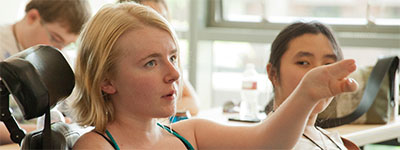Report from Panel Discussion

Panelists included PEERs Leaders:
Cezanne Camacho, Electrical Engineering
Nuvala Fomban, Bioengineering
Kimberlee Sing, Chemical Engineering
Megan Torkildson, Human-Centered Design and Engineering
Rafael Vertido, Computer Science
Quoc-Anh Vu, Electrical Engineering
Panel members discussed their experiences as engineering students and as PEERs Leaders. They shared a variety of reasons they signed up for the PEERs seminar, including:
- They were motivated to participate because of a PEERs presentation that they had seen.
- They identified diversity as a topic that they were interested in or wanted to learn more about.
- It was an efficient use of their time because it fulfilled a requirement.
- They received encouragement from a faculty member or advisor.
Students reported learning a variety of things through the PEERs program, such as:
- ways to talk with friends and family members about diversity in order to encourage and support them in engineering or to raise awareness about diversity in engineering fields
- ways to ensure that technology and products they design are accessible to diverse populations
- strategies for addressing bias in classes or in group work settings
- specific topics that are addressed in the diversity literature including statistics on representation, unconscious bias, stereotype threat, and covert forms of discrimination
The PEERs Leaders were able to point to ways that diversity has made a positive difference in their engineering education. They felt more open to diverse ideas in teamwork settings and more respectful of the fact that everyone brings a different perspective to a team. PEERs Leaders recognized that when a group is more diverse, varying viewpoints with respect to gender, race, disability, or native language can be useful in solving problems effectively.